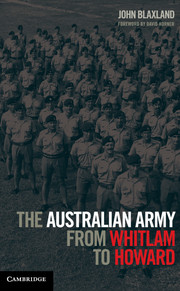Chapter 7 - Operations in Afghanistan, 2001–02
from Part 3
Published online by Cambridge University Press: 05 February 2015
Summary
On 11 September 2001 John Howard was in Washington DC, having celebrated the fiftieth anniversary of the ANZUS Alliance the day before at Washington's Navy Yard. The experience of being in Washington at that time left a very strong impression on him, and within three days he invoked the mutual defence clauses of the ANZUS Treaty, for the first time. The United States quickly identified Afghanistan as the primary target, being the state ruled by the Taliban and closely associated with the terrorist group Al Qaeda, led by Osama bin Laden. The Taliban's refusal to expel Al Qaeda triggered the allied attacks aimed at their overthrow. The attacks began on 7 October, and by 12 November the capital, Kabul, had fallen to the Northern Alliance, the US-led coalition's principal Afghan allies against the Taliban.
Operations Bastille, Slipper and Falconer
Despite still having considerable forces on operations elsewhere, the Australian Government decided to support US-led combat operations in Afghanistan under Operation Slipper. But with troops in East Timor, Solomon Islands and other potential hot spots being watched in Australia's region, the government was reluctant to make large commitments to a far-away conflict that might have left it unable to respond appropriately to regional contingencies. Recognising the imperative to make a meaningful contribution, Howard sought to keep the initial contribution contained and time-constrained. In keeping with the approach taken since Whitlam's military disengagement from Singapore and Vietnam in the mid-1970s, Howard wanted to avoid being embroiled in longer-term fighting, reconstruction or ‘messy nation building’, preferring instead ‘a surgical operation with a finite duration’. That ultimately meant the special forces were the only viable option.
- Type
- Chapter
- Information
- The Australian Army from Whitlam to Howard , pp. 213 - 217Publisher: Cambridge University PressPrint publication year: 2013



